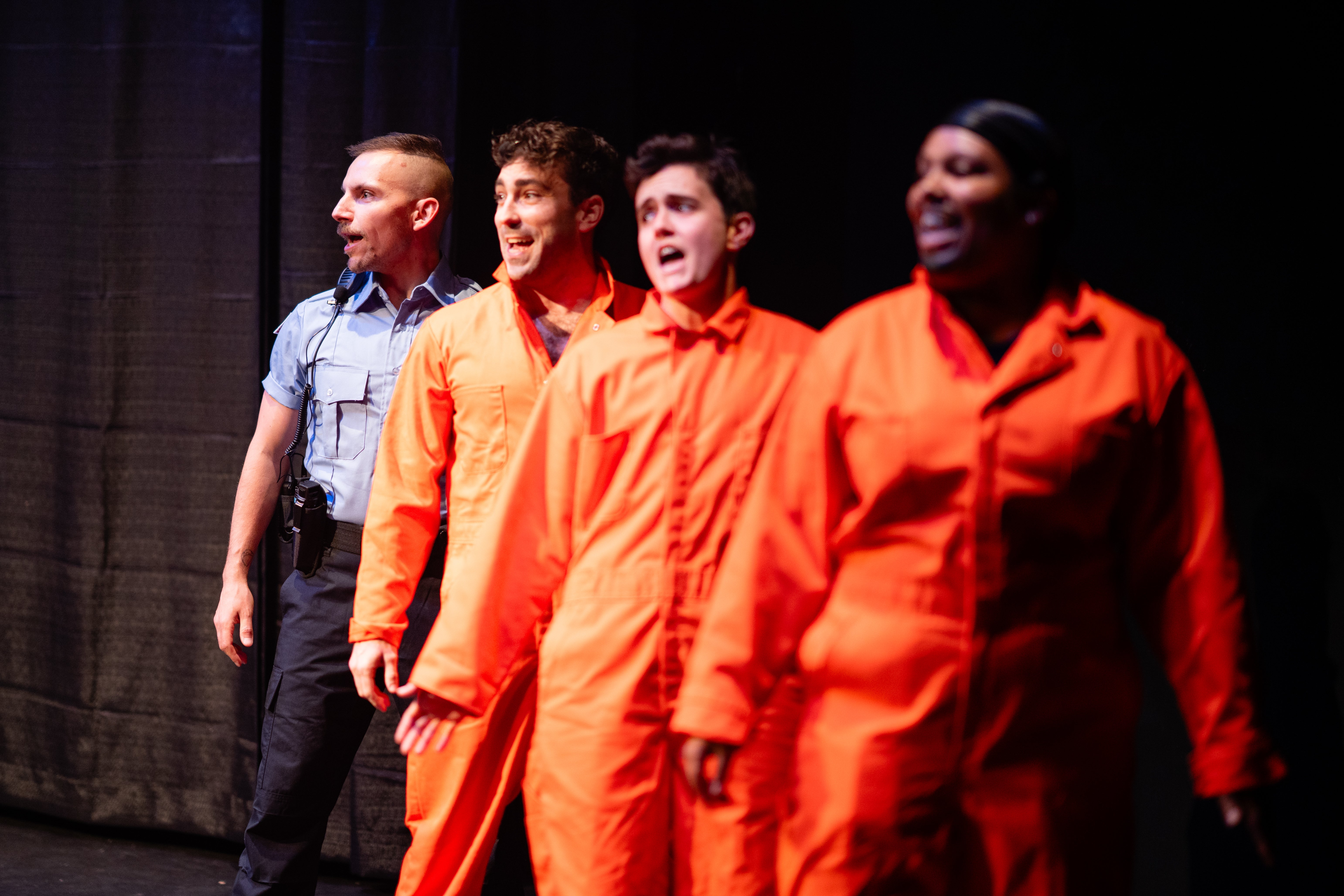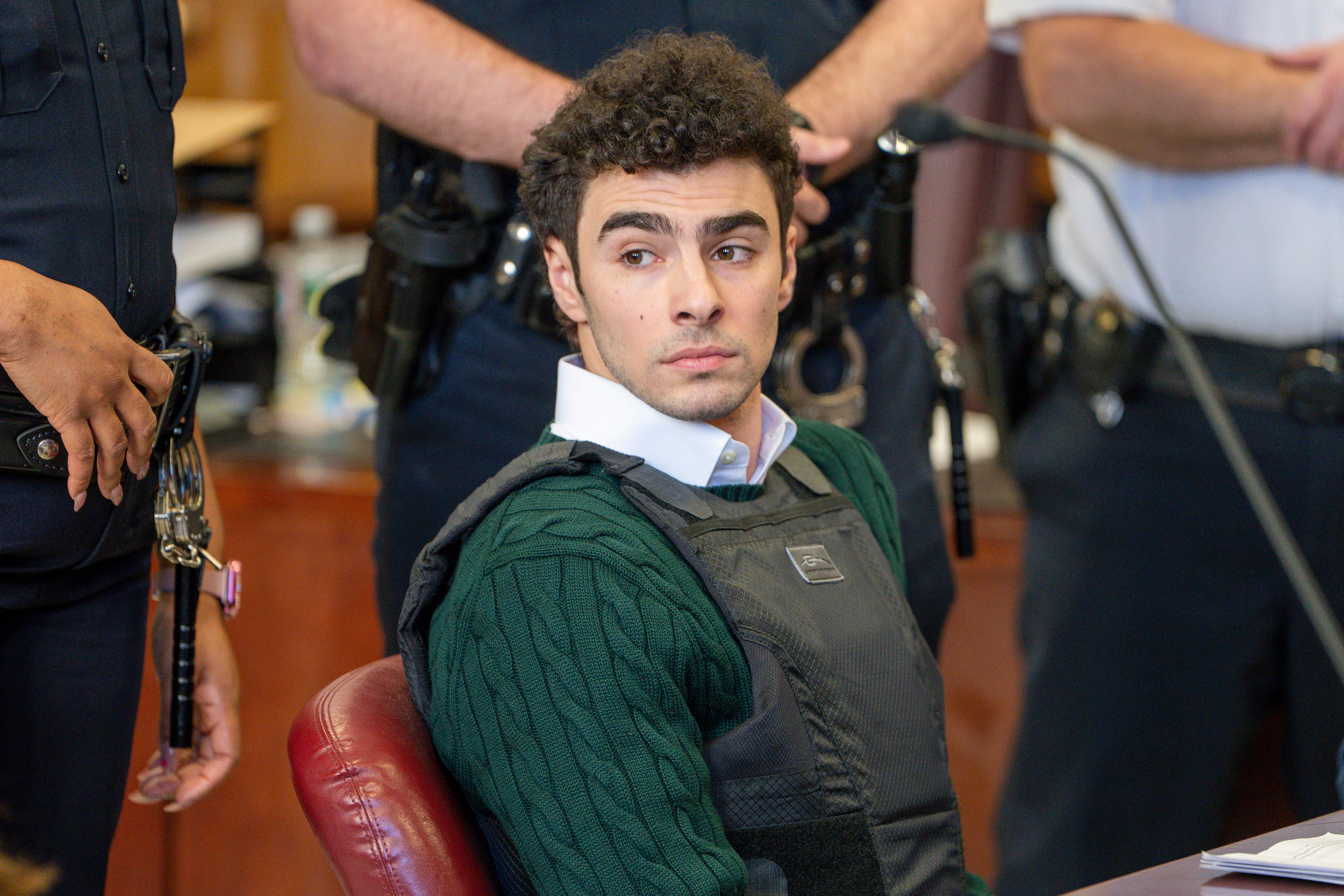Truly excellent satire is like great delivery pizza: it should arrive right on time, nearly too hot to touch.
That’s certainly the case for Luigi: the Musical, a satirical comedy about — and no, you are not hallucinating — accused UnitedHealthcare CEO assassin Luigi Mangione, which premiered Friday in Mangione’s former home of San Francisco.
Standing in line at the Taylor Street Theater, there was a palpable crackle of excitement, and even some trepidation, in the air.
After all, it was a musical. About Luigi. The guy who (allegedly) gunned down CEO Brian Thompson in broad daylight outside a Manhattan hotel in December, using a ghost gun and bullets engraved with the words “deny,” “depose,” and “delay,” thought to be a reference to Mangione’s struggles with the healthcare industry while treating a debilitating back injury.
He hasn’t even gone to trial to face his various state and federal charges, to which he has pleaded not guilty. How in the world would Luigi pull this off? And should they have even tried?
Plenty, it seemed, wanted to see the show from creators Nova Bradford, Caleb Zeringue, Arielle Johnson, and André Margatini go for it, come what may. When the musical was announced in April, it rapidly sold out and made headlines around the world. As the playbill notes, the show was front page news in Iceland before it had ever been performed.
By the time the June 13 premier rolled around, Mangione’s legend had only grown, though his meaning as a national figure remains hotly debated. The Trump administration wants to give the accused CEO-killer the death penalty, while in other quarters, the 26-year-old has become an anti-corporate folk hero, a meme object, and even a sex symbol. He’s reportedly been deluged with fan mail in jail, and he’s already been subject of multiple documentaries.
In the crowd at Luigi, opinions ran the gamut.
Tom, who asked to use only his first name, said making a musical out of Mangione’s story was a “fabulous criticism of the issues in society that lead people to commit violent acts, all things that bother me.”
Mary Lukanuski, who came to see the show from nearby Oakland, was more ambivalent.

“Street assassinations are never a good development,” she said. “That said, he is the avatar of very understandable rage at healthcare in the U.S.”
A nearby theatergoer leaned in and added that healthcare should not be for profit in America.
Another patron, Kyle Reiley, of San Francisco, said, “He was justified in his actions.”
The show was landing in a city and a state alive with militancy. For the previous week, thousands turned out to protest immigration raids in Los Angeles, prompting federal officials to send in the Marines and the National Guard in response, despite objections from state authorities.
The crisis prompted former San Francisco mayor and current California Governor Gavin Newsom to become the most prominent face of the Democratic opposition to the Trump administration, suing the White House in federal court over the Guard deployment and daring Trump’s border czar to arrest him. In Newsom’s old stomping grounds, meanwhile, over 150 have been arrested in anti-ICE protests that at one point shut down a San Francisco immigration court.
The show itself had a police car in front, a security guard with a metal detector wand, and signal-blocking bags for audience members’ cell phones, which were required to be turned off. We were clearly in for a happening.
Things only got more heightened from there. The show takes the actual fact that crypto fraudster Sam Bankman-Fried, disgraced music mogul Sean “Diddy” Combs, and Mangione all overlapped for a time at Brooklyn’s Metropolitan Detention Center and runs riot with the possibilities.
There’s a tap dance duet. Margatini is hilarious as an insufferable SBF, particularly in the song, “Bay Area Baby,” where the exec, the child of Stanford professors in real life, sings, “I’m a Palo Alto nepo baby extraordinaire / and if you say something is illegal I just don’t care,” as well as during a cringey attempt to bribe a guard with a pitch to “take the concept of incarceration and tokenize it.” The hometown crowd, all of whom probably have had a crypto bro yelling in their ear at a bar at some point, lapped it up.
Meanwhile, Diddy, played by Janeé Lucas, struts and shimmies around the stage with an orange prison jump suit and a wolf smile, entering with a twirl to show the mogul’s name embroidered on the back, in sequins no less.
Luigi also gamely revels in its own position in the Mangione-verse. At one point, as the Ivy League grad reads his mail, his lawyer informs him a musical is being made about his story.
“What sick f***s would buy tickets to that?” Mangione, played by Jonny Stein, wonders. Meanwhile, the playbill, in its legal disclaimer section, urges anyone who sues the show to “spell our names right in the headlines.”
For all the outrageous antics, the show seems to veer sincere when dealing with Mangione himself, who wrestles not only with the broken healthcare system, but the fact that the action he is accused of doing in protest did little but land him in prison.
Right when you think the musical might be pure assassination apologia — there’s a scene where Mangione and a prison guard, played by Zeringue, bond over both getting insurance rejections — well, Luigi pulls the rug out from that too, like any madcap satire should.

The final number sees a shirtless Magione carried, figure skater style, in a cloud of smoke, as he sings, gleefully oblivious to the irony, of his dream of escaping prison and making sure “every single human being’s life has worth / so I’ll shoot everybody until there’s peace on Earth.” It got a standing ovation.
Once the cheers faded, and the fifty-some people in attendance filtered out, the serious questions Luigi posed through its haze of absurdity remained. What should be done in the face of systems with major problems? How far is far enough, and what lines shouldn’t be crossed?
In the cool San Francisco night, many of those problems instantly were manifest. The theater is in the Tenderloin, a small neighborhood of highly concentrated, extreme poverty and homelessness. (It’s where conservatives like Florida Governor Ron DeSantis go when they try to paint blue cities as liberal hellscapes.) Multiple people slept on the sidewalk just outside the venue, as well-heeled theatre-goers waited for their Ubers home.
Normally, some might’ve taken self-driving Waymo taxis back to their apartments, but the company had temporarily dialed back service in San Francisco because Los Angeles protesters kept setting the modified Jaguar SUVs on fire.
The day after the premier, thousands were set march through San Francisco as part of Saturday anti-Trump “No Kings” rallies taking place across the country.
Luigi, at its core, is a show about the relation between individuals and the system. To see the system at work means becoming a witness, and becoming a witness means being, on some level, implicated in the system, for good or for ill.
“Luigi: the Musical is now part of the spectacle,” Nova Bradford writes of the show in a director’s note. “And so are you.”
The same goes for politics. We are all part of the spectacle of being alive in 2025. So what are we going to do about it?
Suspect in UnitedHealthcare CEO killing said he 'had it coming,' according to prosecutors
UnitedHealth Group sued by investors over ‘misleading’ information on CEO’s murder
London Grammar tell LIDO Festival fans they hope ‘music can bring us together’
The Latest: 'No Kings' protests spread across US as Trump gets military parade
The Army is set to celebrate 250 years with a parade that coincides with Trump's birthday







